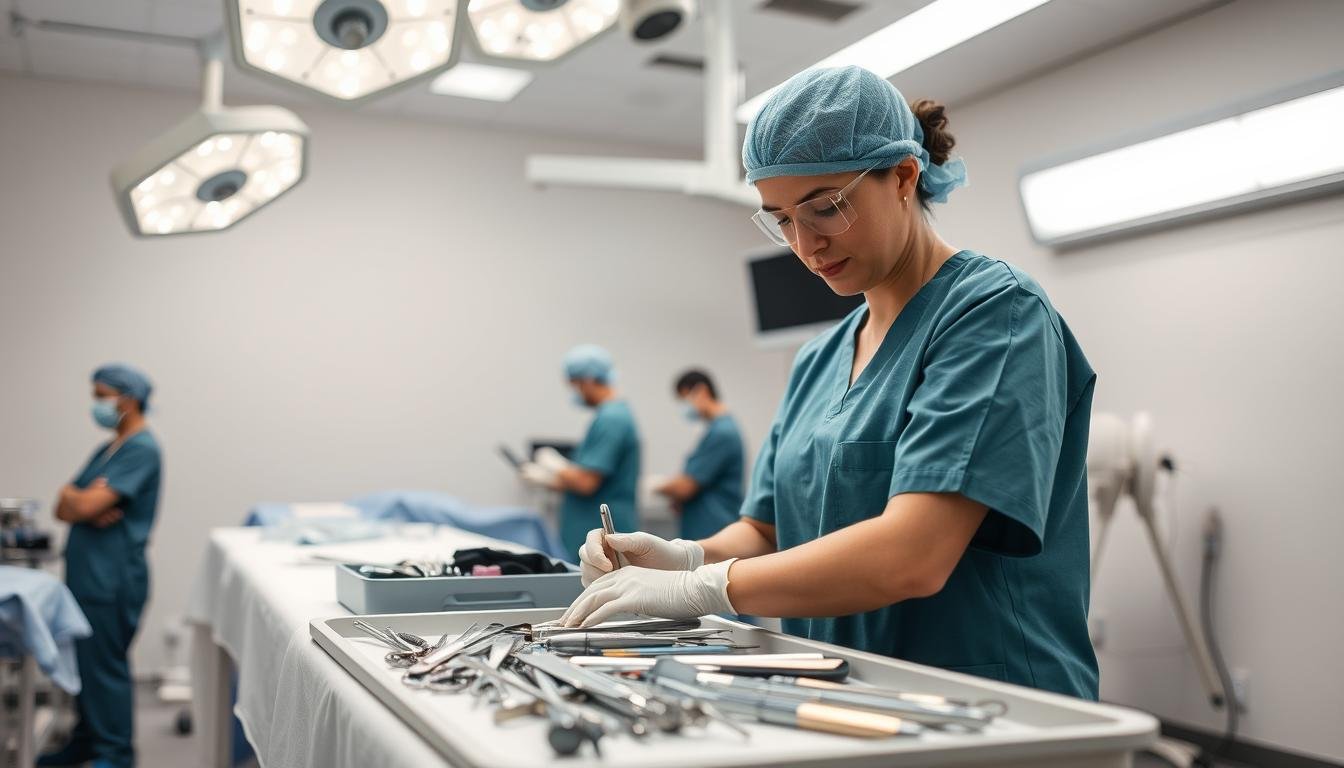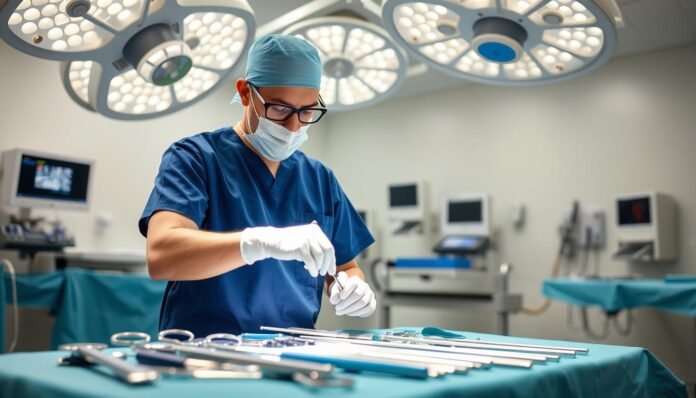Are key members of the surgical team. These professionals ensure smooth and successful surgical procedures.
They prepare the operating room and assist surgeons. Their duties are vital for quality patient care and better surgical outcomes.
As a surgical tech, you’ll work with surgeons and nurses to create an efficient surgical environment.
Your tasks include sterilizing instruments and maintaining a sterile field. You’ll also anticipate the surgeon’s needs during operations.
A focused surgical technologist in a modern operating room, wearing scrubs and gloves, meticulously arranging surgical instruments on a sterile table, bright overhead lights illuminating the scene, with surgical tools and equipment in the background, conveying a sense of precision and professionalism.
Becoming a surgical tech is a rewarding career. You can make a real difference in patients’ lives.
This job offers various work settings. You may work in hospitals, outpatient clinics, or specialized surgical centers.
Your skills ensure patient safety and well-being. Your dedication is crucial to surgical success.
Overview of Surgical Technology
Surgical technology is vital in healthcare. Surgical techs support surgeons and ensure smooth operating room procedures.
The field began in the early 20th century. As medicine advanced, the need for specialized operating room staff grew.
Today, surgical techs are crucial in modern healthcare. They contribute expertise in patient care and sterile techniques.
Surgical technologists work with various medical staff. They create safe environments for surgical procedures.
Their duties include preparing the operating room. They also sterilize instruments and ensure supplies are available.
Surgical techs maintain the sterile field. This is key to preventing infections and promoting good patient outcomes.
The role evolves with medical advancements. Demand for skilled surgical technologists remains high.
These professionals are valued for their attention to detail. Their problem-solving skills and commitment to safety are also necessary.
Educational Requirements
Surgical technologists must complete an accredited training program. These programs are available at community colleges and technical schools and usually take 1-2 years to complete.
Students learn about anatomy, medical terms, and surgical procedures. During clinical rotations, they also gain hands-on experience in operating rooms.
Many employers require certification for surgical technologists. The Certified Surgical Technologist (CST) credential is highly valued.
To earn the CST, you must pass an exam. This exam is administered by the National Board of Surgical Technology and Surgical Assisting.
Keeping the CST certification requires ongoing education. This helps surgical techs stay current with new surgical methods.
Some surgical techs pursue higher degrees for career growth. They may earn associate’s or bachelor’s degrees in surgical technology.
These degrees can lead to leadership roles. Examples include the surgical tech supervisor or education coordinator.
Key Responsibilities of Surgical Techs
Surgical techs are vital in the operating room. They handle tasks before, during, and after surgeries.
They prepare the room and sterilize equipment before surgery. During surgery, they assist surgeons by handing them tools.
They keep the area clean and germ-free. Surgical techs also watch patients and report any changes.
A surgical technologist in an operating room, preparing surgical instruments on a sterile table, wearing scrubs and gloves, with bright overhead lights illuminating the scene, various surgical tools neatly organized, a surgical tray with instruments like scalpels, forceps, and scissors, focused expression, teamwork atmosphere with other medical staff in the background, clean and professional environment.
After surgery, they clean up and restock supplies. They get the room ready for the next operation.
Surgical techs are key to successful surgeries. Their skills help keep patients safe and healthy.
Skills Required for Surgical Technologists
Surgical techs need many skills to do well. They must also deeply understand medical procedures, equipment, and terms.
Paying close attention to details is key. Techs must set up the operating room carefully.
They make sure tools are clean. They also guess what the team needs during surgery.
Techs must talk well with others. They work closely with surgeons, nurses, and other health workers.
Being a team player is very important. Surgeries can be stressful, so techs must work well together.
Handling stress is a must-have skill. Techs stay calm when things get tough.
They make fast choices when needed. Keeping up with new medical tech is also essential.
Techs with these skills help surgeries go well. They play a big part in keeping patients healthy.
Work Environment for Surgical Techs
Surgical technologists work in hospitals, outpatient facilities, and specialty clinics. These places need clean spaces to keep patients safe during surgery.
Surgical techs help with complex operations in hospitals. They may work long shifts, on weekends, or be on call.
Outpatient centers offer more regular schedules for surgical techs. These places do more straightforward surgeries.
Surgical techs must pay close attention to details. They need to keep the operating area clean and safe.
The job can be physically demanding. Techs often stand for long periods and handle heavy tools.
Career Outlook and Opportunities
Surgical technologists have a bright future ahead. The job growth rate is 7% between 2021 and 2031.
This growth is due to increasing healthcare needs. As people age, more surgical procedures are needed.
Surgical technologists can advance in many ways. They can specialize in areas like cardiovascular or orthopedic surgery.
Experienced techs may become surgical first assistants. This role involves overseeing complex procedures and earning higher pay.
In 2021, the median wage for surgical technologists was $51,510. The top earners made over $70,000 annually.
Salaries vary based on location, employer, and experience. Overall, the earning potential is quite good.
FAQ
What is a surgical technologist?
A surgical technologist assists surgeons and nurses during medical procedures. They prepare the operating room and ensure all equipment is ready.
What are the primary duties of a surgical technologist?
Surgical technologists set up the operating room, sterilize instruments, pass tools to surgeons, and keep the area sterile.
What kind of training is required to become a surgical technologist?
Surgical technologists usually complete a postsecondary program in surgical technology. These programs cover anatomy, medical terms, and surgical procedures.
Graduates can take the Certified Surgical Technologist exam for certification.
What skills are necessary to be a successful surgical technologist?
Surgical technologists need attention to detail and good hand skills. They must think quickly, work well in teams, and stay calm.
What is the job outlook for surgical technologists?
The job outlook for surgical technologists is positive. The field is growing faster than average for all jobs.
This growth is due to increased demand for surgical services.
you may also read : How to Become a Nail Tech – Career Guide & Requirements


